|
We know that Man had at least two elder brothers. One of them, Zalman Klionsky, inherited a plant in the shtetl of Zembin (near Borisov), where he lived with his family. The second brother, with unknown name, inherited a clothing factory in the Old Borisov, and his whole family lived in his father's house in the area of the market (see map) near the landmark church.
There was also a sister named Sarah, who married a rabbi and moved to St. Petersburg.
Man inherited a warehouse on the Berezina river, where his whole family used to live. The area is now called New Borisov. The house was burned down in 1941 during the WWII.
Before the Bolshevik revolution of 1917, Man was involved in the timber trade, in addition of being a executive manager for a big estate. His first wife's name was Merke nee Zimmergrad. Her parent were Noah Chaim and Lea Zimmergrad. She was a well educated woman and studied in Warsaw as well. Merke gave birth to eight children.
Merke died while giving birth to Benzion, when she was in her early forties. A year later, Man married again. His second wife, Masha, was some 25 years younger than him, and they had only one son, Ruvim (1918-1989).
Everything changed after the 1917 revolution and the following civil war when Man lost all his possessions. Afterwards he was forced to take a very low position in the timber trade, probably as a watchman.
The World War II began in Russia on June 22, 1941. Already four days later, on June 26, Man was helping his wife Masha and his youngest son by Merke, Benzion, to catch a train in hopes that the train will take both of them away from Borisov. The very next day Man and his son Nathan traveled to nearby town Orsha by a truck. From Orsha Man managed to reach Moscow, where Ruvim , his only son by Masha lived. Eventually he reached Kuibishev (now Samara) on Volga river, where his children Mina-Leya and Leib lived at that time (they were evacuated there as well).
As the family story goes, right after the end of WWII, in 1945 and American officer appeared in Borisov. He was trying to locate the survived Klionsky and Man Klionsky in particular. Unfortunately, after being told by neiboughs that the whole family died in the ghetto during the war, he left without leaving his contact information.
Who was this officer? Who sent him to Borisov? It is still a mystery...
After the war, Man returned to Borisov to live with his son Nathan. He worked at the local synagogue in Old Borisov and died in 1957.
Harry [Joseph-Girsha] (1898 - 1981) Lyons
Girsh worked in Borisov as a pharmacist and emigrated to America around 1911. In the 1930s, the family in Borisov received several letters from Girsh, who lived in Philadelphia at that time. Soon it became dangerous for the Soviet citizens to communicate with anybody outside the country. It maybe interpreted by authorities as a treason and espionage. So, the exchange of letters stopped and never resumed...
What has happened to Girsh Lyons(Klionsky)? It is one of the family unresolved puzzles. - RESOLVED IN 2020! See `Related Articles` tab.
Isaac Klionsky (1898 - 1976)
| Unlike his siblings, Isaac did not get any college education. He was extremely strong physically.
During the Russian Civil War of 1917 - 1921 he was recruited into the Red Army cavalry corps as a blacksmith. He participated in the Red Army advance into Poland in 1920.
He and his wife Manya Goldina have had two children: Lazar, born in 1924 and daughter Genya "Yevgenia", born in 1933 (it was changed later in documents to 1931).
After his wife died in 1973, Isaac lived with his daughter's family.
His grandson, Mark, who is now living in the United States, remembers him as a very caring person. As an example, Mark recalled the story that happened sometime around 1975 in Minsk.
|
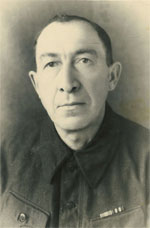
Isaac, about 1945
|
The truckload of the fine pineapples were delivered to the local store. As a rule, general population of the Soviet Union experienced a shortage for a lot of basic things including exotic fruits. Mark's family was no exception so he never tasted pineapple before. The line to the store was almost a mile with one pineapple per person.
As a Russian Civil War veteran Isaac had a better chance because he had to stay in another, somewhat smaller line for veterans only. So he stayed in that line and it took him entire day, but finally he got his pineapple and he shared it with his grandchildren. The joy was so overwhelming that Mark still vividly remembers that day.
As for his children, Lazar became a general practice physician and married Frida, who was a school history teacher. They had two children: Boris born in 1953 and Raisa born in 1959. Presently the whole family lives in Israel.
Evgenia "Genya" was a kindergarten teacher, and her husband, Leonid Tsitlik, an engineer. They have two sons -- Arkadiy and Mark. They all now live in Baltimore area, state of Maryland.
|
Chaim "Yefim" Klionsky (1901 - 1973)
Chaim "Yefim"attended school and heder, and got his education at a two year college specializing in timber, and later worked in the timber trade.
He spend the WWII years in Kuibishev city(now Samara).
He had a son, Mark, who was born in 1940. Mark graduated from the Minsk Politechnics and worked as an engineer.
He also played piano and saxophone quite well.
In 1992, he got in a car accident and died as a result of it in 1993.
Chaim was married to Nina and had two daughters, Alla and Yevgenia.
|
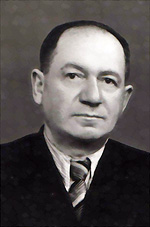
Chaim "Yefim" in 1960, Minsk
|
|
|
Eliahu "Iliya" Klionsky (1903 - 1981)
| Eliahu "Iliya"graduated from a two year technical college. He and his wife Berta moved to Leningrad in 1924. During the war Ilia's family was evacuated to Kuibishev together with other employees of the plant where he worked. They returned to Leningrad after the war.
Ilia and Berta had two children. Boris was born in 1936. He married Anna Dvoskina in 1962, and in 1963 their daughter Marina was born. Boris died from a hart attack in 1982.
Marina got married and in 1989 emigrated to the United States. Unfortunately, connection to her has been lost since.
|
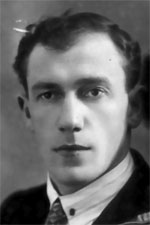
Eliahu "Iliya" in 1930s
|
|
|
Leib "Lev" Klionsky (1905 - 1971)
| Leib "Lev" graduated from a medical college in Minsk and worked as a surgeon in Leningrad. He also was evacuated to Kuibishev, where he worked as the head of the surgical department of a prison. After the war, he worked as the head surgeon at a hospital in Leningrad.
1952 was a bad year for Soviet Jews. Stalin and his cohort orchestrated what is known in the west as “the doctors plot”, claiming that some doctors tried to poison high-ranking Soviet officials. Most of the accused had Jewish backgrounds. As a result, across the entire Soviet Union, Jewish doctors were renounced, forced out of their jobs and sometimes jailed (or worse). At this time, in 1953 Lev was fired from his position and from the hospital. Eventually, after Stalin's death he was rehired as a regular surgeon, but not as a head of the department as he was before.
He retired in 1967, moved to Sochi (a resort city on the Black Sea, near Turkey), where he got married to his school sweetheart and died in 1971.
|
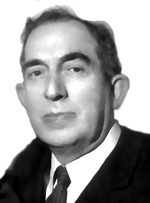
Leib "Lev" in 1966
|
|
In the 1930s, Leiba Klionsky and Mirra Mirovaya were fellow students in Medical school in Minsk. They were planning to get married, but had a fight because Mirra dyed her hair (she was a brunette and changed the color to red) without asking Leiba first. Leiba was very disappointed and they fought about it and broke up over it
Later Leiba moved to Leningrad, and lived there with Mina-Leya (his sister) and Meruta (his niece - not his ex-girlfriend). He didn't marry until he met Mirra again...
In the early 1960s Mina-Leya and her second cousin Elizaveta Klionsky went to Sochi (a popular resort town on the Black sea) on vacation. There they ran into Mirra who also had never gotten married. Mirra lived in Sochi working as a physician for one of the local resorts.
After learning of this, Leiba moved to Sochi around 1966-1967 and finally married Mirra. By that time he was already retired.
Ester Shapiro (Lieba's great niece) visited Lieba in Sochi every summer until his death in 1971.
|
Mina-Leya (Klionsky) Krupkin (1909 - 2004)
| Mina-Leya attended a regular Yiddish school (they were all closed by 1927) and later a two year college in Vitebsk, Belarus. Gradually, she made her way to gain a position of economist in Minsk, capital of Belarus.
In 1935 in Leningrad, she met Boris Krupkin, who was also born in Borisov in 1910. On April 28, 1939, their only daughter Meruta was born.
As the Nazi Germany invaded Russia on June 22, 1941 Boris Krupkin volunteered to join the Red army at the very first day of the war.
He died in battle on February 1943. Meanwhile, Mina-Leya and her daughter Meruta were evacuated to Kuibishev (now Samara, a city on a Volga river, in the center of Russia).
After the war she returned to Leningrad.
Mina-Leya has had a long life and died in November 2004.
|
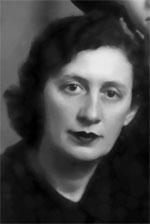
Mina-Leya in 1955, Leningrad
|
|
Mina-Leya's only daughter Meruta graduated from a medical college. She worked as a Pediatrician, and is retired now. She married Anatoliy Kezlah in 1962. In December 1963, Meruta gave birth to their daughter Esther, and in February 1965, they had a son Boris, named after his grandfather.
Ester graduated from the Engineering Institute in Leningrad and worked as an engineer and also contributed to an independent Jewish newspaper "Ami" - My Folk. She married Yakov Shapiro in December 1986. In 1987, she gave birth to a daughter Hanna.
Boris also graduated from the Engineering Institute in Leningrad. He married and divorced Anna Spasskaya with whom he had have two children - Aleksiy (born in 1988) and Olga (born in 1989). He is currently married to Elena Medvedeva.
|
Benzion "Bennya" Klionsky (1914 - 1941)
|
Benzion received some kind of injury during his birth and was limping all his life. (His mother Merke died right after his birth.)
As is stated above, on June 26, 1941, Man put his second wife Masha and Benzion on a train to the town of Orsha, further in Russia.
However, the train was bombed by Nazi planes somewhere between Borisov and Orsha.
Subsequently, Masha and Benzion were caught by Germans and sent back to Borisov ghetto, where they were both killed in the autumn of 1941 during Borisov ghetto liquidation.
|
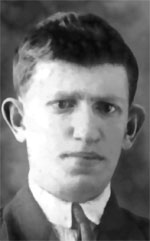
Benzion in late 1930s, Borisov
|
Ruvim Klionsky (1919 - 1989)
|
Ruvim, the son of Man and his second wife Masha, was fighting in the war with the Finns [ Soviet invasion in the winter of 1940]. His tank caught fire, and Ruvim was shot in his arm. Later he was decorated with medals and was the first soldier from Borisov who was awarded them.
After the war, Ruvim studied in Moscow and married one of the students (Anna), with whom he had three sons Boris born in 1946, Mark born in 1949 and Igor born in 1957. All three of whom attended the same mining college.
Boris married Larisa. He died in 1985 from an anevrism. Their daughter Aminat moved to Israel when she was 16. She has a son Dmitri. Mark married Valentina and had two children. Igor married Nina and they had two children: Anna who lives in Haifa and Boris who serves in the Israeli army. Igor joined his family in Israel where he and his wife Nina work at the architectural firm.
|
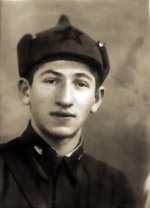
Ruvim, late 1930s
|
Nathan Klionsky (1911 - 1996)
Transalated by Elena (Klionsky) Heilman, Detroit
Final Edit by Matt Klionsky, Chicago
|
Natan was born July 4th, 1911 in Borisov, the seventh child of Man Klionsky and Man's first wife Merke. He started school early. At first Natan studied at a Jewish school, then in a Polish school, and finally a Belorussian secondary school.
Afterwards, between 1928-1931, Natan studied in a polytechnical school, but then left to serve until the army between 1931 and 1933.
In 1934 Natan was admitted to the Moscow energy institute. He was supposed to graduate in 1939, but two weeks prior to his graduation he was accused of being disrespectful of the Leader (apparently, at a friend’s wedding he failed to toast Stalin’s health).
Along with everybody else (at that time) intent on building any sort of career, Natan belonged to the young communist association (Komsomol).
|

Nathan, 1936
|
|
So, at a Komsomol meeting they talked about excluding him from membership, which would be certain to lead to Natan’s arrest. Natan expected to be arrested any day. However September of 1939, the division of Poland between Soviet Union and Nazi Germany (in the Soviet Union it was known as "the liberation of Western Belorussia" ) stopped this process.
Instead, he was drafted into the army again, to participate in that campaign against Poland . Afterwards he participated in the war with Finland (winter of 1939-1940).
Once back in Borisov, (and by that time no one wanted to accuse him of treason anymore, since the accusers themselves had disappeared into the GULAGs. As Natan’s son Boris said, “they followed the path that they had prepared for Natan.” ), Natan found work as a technician at the power plant; He led the construction of the Borisov power station.
After the station was constructed Natan worked there as a lead engineer. (A poorly educated communist party leader became its general manager; Nathan was the only one with the technical knowledge to actually keep it operating.)
The lull was not long and in 1941 he was drafted again, this time, to fight the invading Germany. Natan fought at the front until 1943. He fought near Moscow in 1941 as well as near famous Stalingrad and Kursk in 1943, and suffered a severe concussion.
Natan met his wife Tatiana during the war, both were soldiers. Comrades in arms, they got unofficially married at the front (they were later officially married in 1943). In March 1942, Tatiana was discharged because she became pregnant. Later that year, their son Vladimir was born; daughter Nina followed in 1946, and son Boris was born in 1951.
He was transferred to city of Gorkiy where he stayed until 1946, when the family returned to Borisov. Natan used money received from fighting in the war to build the house on Pochtovaya street, where his family and descendants have lived ever since.
In later years, Natan participated in building the Borisov plywood and match factory.
We know that Natan traveled extensively in the USSR.
Natan's family is no longer solidly concentrated in Borisov. While children Vladimir and Nina remain there, and each of them has a son and grandchildren there also, Vladimir's daughter Alena lives in Dusseldorf, Germany with her daughter.
And, Boris (with his daughter Marina and her children) moved to Israel, while Boris' other daughter Yulia lives in Calgary, Alberta, Canada with her husband and son.
|
Aknowledgments
The following people contributed to this article: Boris Klionsky, son of Natan, Tel Aviv
|